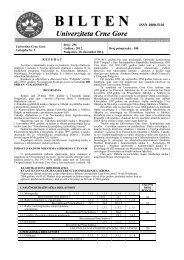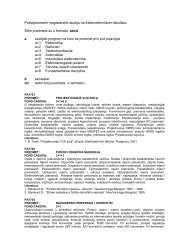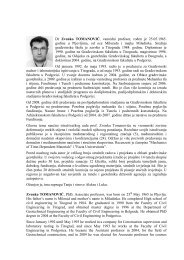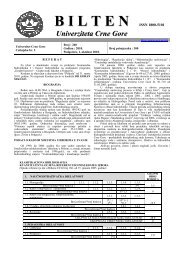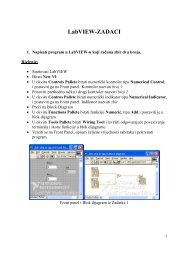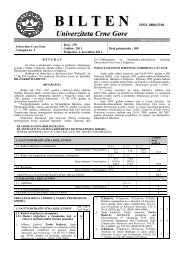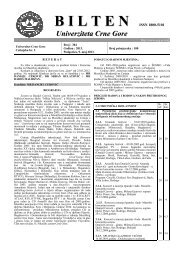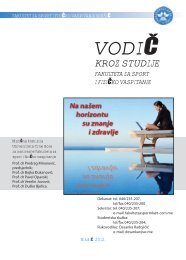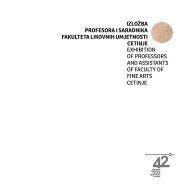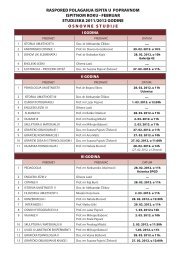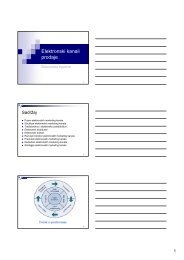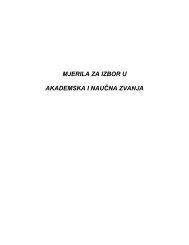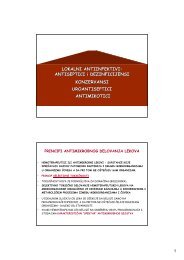WHO monographs on selected medicinal plants - travolekar.ru
WHO monographs on selected medicinal plants - travolekar.ru
WHO monographs on selected medicinal plants - travolekar.ru
Create successful ePaper yourself
Turn your PDF publications into a flip-book with our unique Google optimized e-Paper software.
<str<strong>on</strong>g>WHO</str<strong>on</strong>g> <str<strong>on</strong>g>m<strong>on</strong>ographs</str<strong>on</strong>g> <strong>on</strong> <strong>selected</strong> <strong>medicinal</strong> <strong>plants</strong><br />
C<strong>on</strong>traindicati<strong>on</strong>s<br />
Oleum Ricini should not be used as a laxative during pregnancy or while<br />
breastfeeding (5, 13), or in children under the age of 12 years.<br />
Due to stimulati<strong>on</strong> of bile flow, the oil should not be used by patients<br />
with biliary tract obst<strong>ru</strong>cti<strong>on</strong>s or other biliary disorders.<br />
Oleum Ricini is c<strong>on</strong>traindicated in patients with hypersensitivity or<br />
allergy to the oil, appendicitis, chr<strong>on</strong>ic inflammatory bowel disorders,<br />
undiagnosed abdominal pain or severe dehydrati<strong>on</strong> associated with the<br />
loss of salt and water.<br />
It should not be used in cases of intestinal blockage and ileus.<br />
Warnings<br />
Inducti<strong>on</strong> of labour: use of the c<strong>ru</strong>de d<strong>ru</strong>g in pregnancy (after 40 weeks of<br />
gestati<strong>on</strong>) requires the supervisi<strong>on</strong> of a physician, midwife or other experienced<br />
health care professi<strong>on</strong>al.<br />
As a cathartic: intake of cathartic d<strong>ru</strong>gs for more than a few days may lead<br />
to a worsening of intestinal hypomotility. Do not take for more than<br />
3–5 days without c<strong>on</strong>sulting a health care professi<strong>on</strong>al. Overdose may<br />
lead to nausea, vomiting, painful abdominal cramps and severe diarrhoea<br />
with loss of water and electrolytes. In case of overdose, a health care professi<strong>on</strong>al<br />
should be c<strong>on</strong>sulted regarding possible replacement of fluid and<br />
electrolytes.<br />
Precauti<strong>on</strong>s<br />
D<strong>ru</strong>g interacti<strong>on</strong>s<br />
C<strong>on</strong>comitant use of castor oil with cardiac glycosides, antiarrhythmic<br />
d<strong>ru</strong>gs, diuretics, cortisol, liquorice, antihistamines and fat-soluble vitamins<br />
may reduce the efficacy of these d<strong>ru</strong>gs or, in the case of cardiac glycosides,<br />
may increase the risk of adverse events due to fluid and electrolyte<br />
losses.<br />
Carcinogenesis, mutagenesis, impairment of fertility<br />
Genetic toxicity studies were negative for inducti<strong>on</strong> of mutati<strong>on</strong>s in the<br />
Ames test using Salm<strong>on</strong>ella typhimurium for inducti<strong>on</strong> of sister chromatid<br />
exchanges or chromosomal aberrati<strong>on</strong>s in Chinese hamster ovary cells,<br />
and for inducti<strong>on</strong> of micr<strong>on</strong>uclei in the peripheral blood erythrocytes of<br />
mice fed a diet c<strong>on</strong>taining 10% seed oil for 13 weeks (28). No significant<br />
changes were noted in a screening study for male reproductive end-points,<br />
including sperm count and motility, and no changes were observed in the<br />
280



